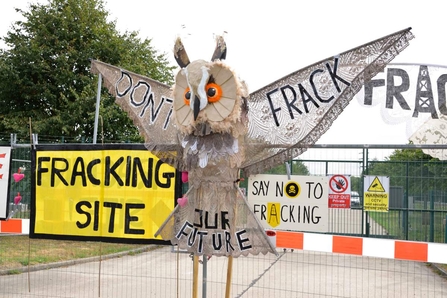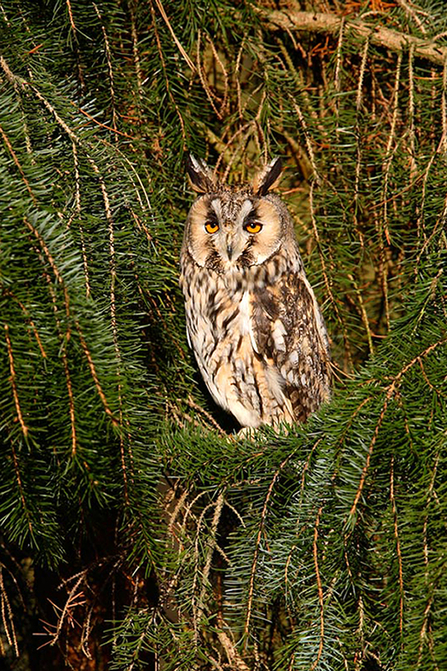
Image Credit: Frack Free Mission

Image Credit: Frack Free Mission
Nottinghamshire Wildlife Trust has today highlighted its concerns for the county’s wildlife and landscape should the government lift the moratorium on fracking in response to the energy crisis.
The Trust has long campaigned to protect precious wildlife areas across the county from the damaging impact of the exploration for and extraction of shale gas in locations including the heart of Sherwood Forest. Most recently, the charity stood shoulder to shoulder with local campaigners to fight an application by IGas, to delay the capping and restoration of an exploratory drilling site next door to the Trust’s Misson Carr Nature Reserve in North Nottinghamshire.
Following the Government’s recent announcement in which it outlined its intention to lift the moratorium on fracking, the Trust fears that Nottinghamshire will become a battleground as energy companies seek to unlock the huge reserves of damaging fossil fuels.
The prospect of future fracking fills us with dread, but also determination to continue standing up for wildlife.Erin McDaid, Head of CommunicationsNottinghamshire Wildlife Trust
Speaking about its concerns, Head of Communications Erin McDaid said:
“Nottinghamshire Wildlife Trust is acutely aware that the nation is in the grip of cost of living and energy crises and the pressure this is placing on households and businesses. Whilst we should avoid the game of crises ‘Top Trumps’, we cannot ignore the fact that we are already in the grip of climate and ecological crises; making the announcements re fracking and the possible new licenses to extract North Sea gas and oil extremely worrying. This approach would seriously undermine the Government’s well-documented and often repeated commitment to reaching net zero carbon emissions by 2050.”
The Wildlife Trust welcomes measures to help families, businesses and charities with soaring energy costs, but believes that long-term solutions to energy security and affordability will come through a focus on energy efficiency and investment in renewable energy sources.”
Erin added: “The prospect of future fracking fills us with dread, but also determination to continue standing up for wildlife. Such a clear change of direction, less than a year after hosting the COP 26 climate summit and at a time when the impacts of climate change are so viscerally evident, seems shortsighted to say the least. Consumers are told that energy efficiency is the first defense against higher bills, so surely rolling out measures such as home insulation is a ‘no brainer’ – however our energy is produced?”
The Government has previously said that the extraction of shale gas should only take place where there is the local community support – a bar, which the Trust believes Government has realised would be unassailable in the face of widespread opposition. The Trust fears that the energy crisis is now acting as a Trojan Horse for the extraction of new fossil fuels.
The gas accessed through fracking will unavoidably damage our shared environment with no real prospect of it pushing energy prices down or bolstering energy security for at least a decade – whilst in ten years’ time the impacts of climate change could be catastrophic.Erin McDaid, Head of CommunicationsNottinghamshire Wildlife Trust
Erin continued: “The Government appear determined to override local environmental and safety concerns under the guise of energy security. The gas accessed through fracking will unavoidably damage our shared environment with no real prospect of it pushing energy prices down or bolstering energy security for at least a decade – whilst in ten years’ time the impacts of climate change could be catastrophic.”

Image Credit: John Smith
The Trust is also worried that the pro-fracking lobby will seek to undermine people’s legitimate concerns for wildlife and the local environment. At Misson Springs, the charity has campaigned alongside local residents for many years to protect the wildlife at Misson Carr from impacts of drilling linked to fracking. In line with original planning consents, Nottinghamshire County Council legitimately ruled that the exploratory drilling site be capped off and restored. Last month, with restoration work imminent, a report in the Sun, subsequently reported on talk radio station LBC’s website, cited ‘wildlife experts’ claim that Long-eared owls, a scarce breeding bird in the UK which has been recorded at Misson Carr, left the nature reserve ‘years ago’.
Erin added: “Vladimir Putin has rightly been accused of weaponising energy supplies, but we fear that the pro-fracking lobby could weaponise people’s democratic right to protect their local environment and wildlife. We have legitimate concerns for the wildlife and hydrology at Misson Carr and if anyone had bothered to ask, we could have confirmed that the owls had bred again this year."
Much of Nottinghamshire sits on top of huge reserves of shale gas. In addition to the Misson Springs drilling site in North Nottinghamshire, previously identified potential access points include part of the ancient Sherwood Forest landscape - the National Trust’s Clumber Park.
Prior to the moratorium, fracking already benefitted from a unique fast-tracked planning process. Now, with talk of Government having a ‘red tape bonfire’, Nottinghamshire Wildlife Trust fears that allowing the fracking genie out of the bottle could result in the county’s landscape becoming something of a ‘Wild West’ in planning terms - undermining long overdue efforts to put wildlife into recovery.